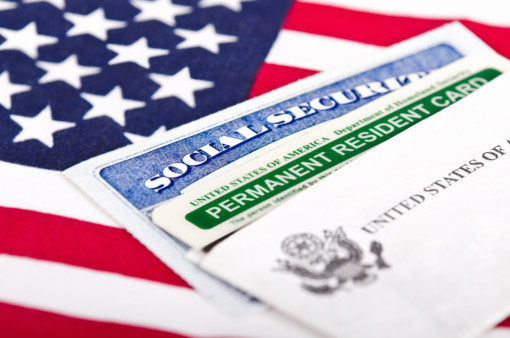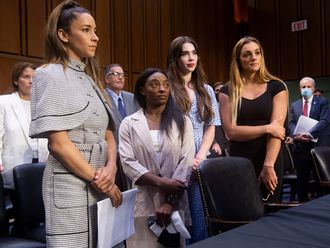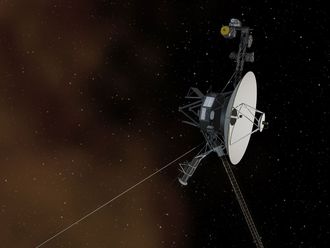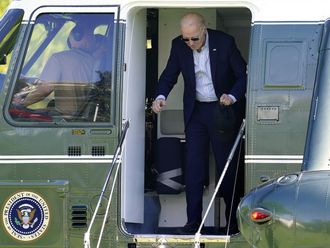
Houston - Immigrants who rely on public benefits for food, housing and medical care could be denied green cards under new rules put forth Saturday by the Trump administration that would effectively limit family-based "chain migration," as the president calls it.
The administration said the rule announced by the Department of Homeland Security would affect about 382,000 people a year, but opponents have said it could have a far greater chilling effect, leading current green card holders to stop using public benefits for fear of being deported.
"Those seeking to immigrate to the United States must show they can support themselves financially," Homeland Security Secretary Kirstjen Nielsen said in a Saturday statement, adding that the new rule would "promote immigrant self-sufficiency and protect finite resources by ensuring that they are not likely to become burdens on American taxpayers."
The rule is one of several efforts by the Trump administration to further restrict legal immigration, including limits on those seeking green cards to immigrate to the U.S. and those already in the country on temporary visas trying to adjust their status to stay permanently.
It does not need to be approved by Congress but faces a 60-day public review once published in the Federal Register in coming weeks.
"After DHS carefully considers public comments received on the proposed rule, DHS plans to issue a final public charge rule that will include an effective date," the agency said.
Fight against the rule
Immigrant advocates and congressional Democrats have already vowed to fight the rule, and political observers said it could become a factor in upcoming midterm elections that will determine which party controls Congress.
"I see the Trump administration's hostility towards immigrants as part of a strategy of mass distraction to keep the focus on fomenting outrage directed at Latinos while keeping the focus off of the corruption and graft that are gripping the White House and the GOP," Rep. Luis V. Gutierrez, D-Ill., chairman of the Immigration Task Force of the Congressional Hispanic Caucus, said in a statement.
"Self-sufficiency has been a basic principle of United States immigration law since this country's earliest immigration statutes," the nearly 500-page proposal states, insisting that "the availability of public benefits not constitute an incentive for immigration."
Under federal law, those seeking green cards must prove they will not be a burden to the state, or a "public charge." But the administration's new public charge rule would require immigration officials to give added weight to an applicant's potential dependency on public assistance.
Officials would also have to consider certain medical conditions such as mental illness, cancer and heart disease as deciding factors because, according to the new rule, "an alien is at high risk of becoming a public charge if he or she has a medical condition and is unable to show evidence of unsubsidized health insurance."
Elderly immigrants receiving discounted prescriptions through Medicare Part D could be forced to stop participating or lose their legal status.
Applicants who don't qualify for green cards under the new rule could be asked to pay cash bonds of at least $10,000 to avoid being rejected.
Mark Krikorian, executive director of the Center for Immigration Studies in Washington, which advocates for limits on legal migration, called the new rule "long overdue."
"How wealthy do you have to be to be able to pay your own bills?" Krikorian said. "The point here is can you support yourself. There's no justification for admitting poor immigrants who need my money and your money to feed their kids.... We've already got enough people we have to support."
Krikorian said we live in a new age of immigration in which the poem inscribed at the base of the Statue of Liberty _ "Give me your tired, your poor, your huddled masses yearning to breathe free" _ no longer applies.
"Nobody coming over from Sicily to Ellis Island was accepting food stamps," he said.
Before the new rule, someone was considered a public charge if they relied on government cash assistance for more than half of their income. Under the new rule, officials would have to take into account non-cash benefits, such as food stamps, Section 8 housing assistance and Medicare prescription drug programs.
"The idea that you can receive food stamps, housing (assistance) and somehow be considered magically self-sufficient because you don't get cash benefits is a lie," Krikorian said. "It's introducing honesty into our immigration policy."
The announcement drew a strong reaction from Democrats.
Gutierrez noted that Stephen Miller, the president's top immigration adviser, pushed for the new rule in addition to limits on refugee admissions, Deferred Action for Childhood Arrivals and temporary protected status, "restricting the ability of legal immigrants to fully assimilate and apply for citizenship."












